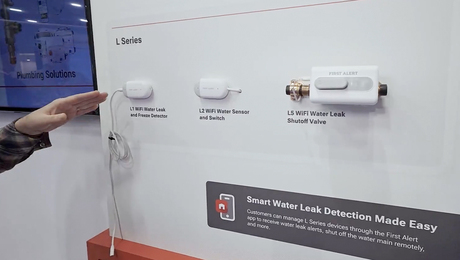Ground-fault circuit interrupters (commonly called GFCIs or GFIs) are nifty electrical devices that detect current leaks (ground faults) down to the milliampere range from defective power tools, appliances or electrical wiring and respond by shutting off the power within one-fortieth of a second to prevent harmful electric shocks (photo above).
The National Electrical Code (NEC) requires ground-fault protection for all 125v, single-phase, 15-amp and 20-amp receptacles located where people might simultaneously contact an electrical defect and a grounded surface such as a faucet or a damp concrete slab. This includes receptacles that serve kitchen countertops, wet-bar countertops (when receptacles are within 6 ft. of the wet-bar sink), bathrooms and crawlspaces at or below grade, plus most receptacles located outdoors, in garages, in unfinished basements or in grade-level sections of unfinished outbuildings used for storage or workshops (exceptions are listed in section 210-8 of the 1996 NEC).
Builders can meet the code either by installing GFCI receptacles, which protect their own outlets and all downstream receptacles (relative to the breaker panel), or by installing GFCI circuit breakers in the breaker panel. GFCI circuit breakers work like normal circuit breakers (which prevent wires from carrying excess current that could cause fires), plus they provide ground-fault protection for all receptacles on the circuit.
GFCI protection also is now required for all electrical equipment used by job-site personnel, unless the power comes from a two-wire, single-phase generator with an output of 5kw or less and with circuit conductors that are insulated from grounded surfaces.
Where necessary, builders can comply by using special portable GFCIs such as GFCI adapters (which plug into normal unprotected receptacles to provide one or more protected outlets), GFCI plugs (which replace the existing plugs on cords or power tools) or GFCI extension cords.
Some builders are tempted to make GFCI extension cords that incorporate the relatively inexpensive GFCI receptacles used in permanent installations. This strategy might beat having no ground-fault protection at all, but it doesn’t meet the code. Approved portable GFCIs contain a relay that trips the power if the neutral wire on the service-panel side of the GFCI happens to get severed or disconnected (for instance, if the neutral blade on the GFCI’s plug makes a poor connection with the power-supplying receptacle).
GFCI receptacles, which are designed to be hard-wired to the power source, lack this relay because it’s assumed that a hard-wired neutral wire won’t come loose. If the neutral wire on a GFCI receptacle does make a bad connection, as it might if the receptacle is installed in a homemade portable, the unit won’t trip as it should in the presence of a ground fault, and someone might get shocked or electrocuted.
GFCI receptacles and circuit breakers are stocked by electrical suppliers, hardware stores and home centers. Portable units might be harder to find, but a number of companies make them, including Coleman Cable Systems (800-323-9355), Hubbell (203-882-4900), Leviton (800-323-8920), Pass & Seymour/Legrand (800-223-4185) and TRC (800-780-4324).
Portable GFCIs should plug directly into receptacles because any ordinary extension cords placed between the GFCIs and the power source won’t be protected. All GFCIs have test buttons that allow users to verify that the units are working properly. Monthly testing is recommended. A defective GFCI can provide power while no longer protecting against shock.
Healthy GFCIs won’t prevent shock if a person gets between two current-carrying wires. The units interpret this as increased load, not as current leakage.
Left to right: Leviton 20-amp GFCI receptacle, Seimens 20-amp GFCI circuit breaker, TRC GFCI extension cord and TRC GFCI quad box with built-in “fast breaker.”
Fine Homebuilding Recommended Products
Fine Homebuilding receives a commission for items purchased through links on this site, including Amazon Associates and other affiliate advertising programs.

Handy Heat Gun

Affordable IR Camera

Reliable Crimp Connectors






















